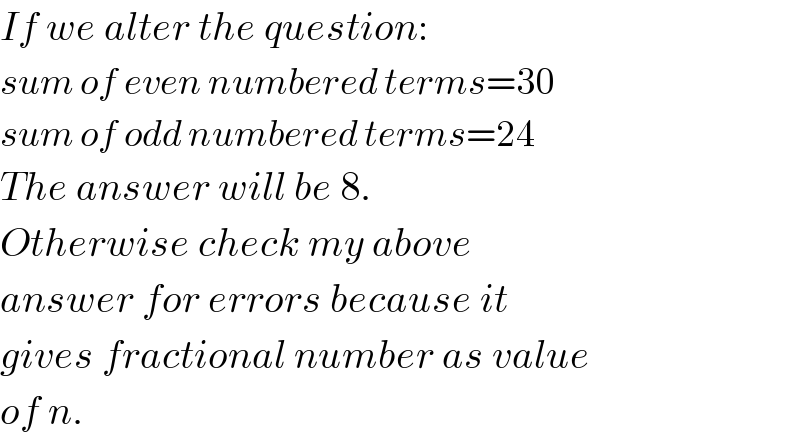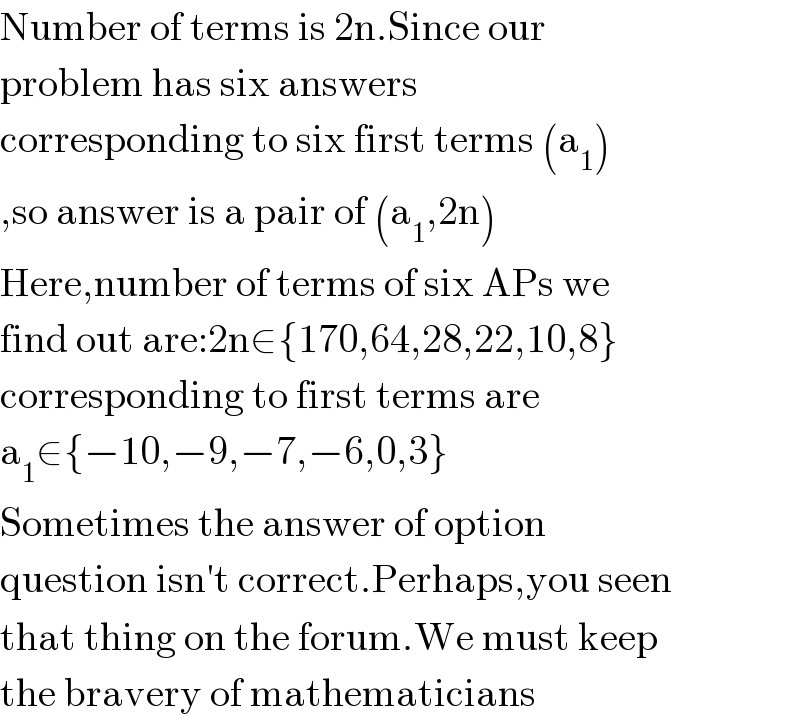
Question and Answers Forum
Question Number 112810 by Aina Samuel Temidayo last updated on 09/Sep/20

Answered by Rasheed.Sindhi last updated on 10/Sep/20
![t_1 ,t_2 ,t_3 ,...,t_n ; n∈E............(1) Sum of odd numbered terms: t_1 +t_3 +t_5 +...+t_(n−1) =30....(2) Sum of even numbered terms: t_2 +t_4 +t_6 +...+t_n =24........(3) Last term exceeds first by 10.5: t_n −t_1 =10.5......................(4) n=? (1): a,a+d,a+2d,....,a+(n−1)d (4):t_n −t_1 = (a+(n−1)d)−(a)=10.5 d=((10.5)/(n−1))=((21)/(2(n−1))).....★ ⇒n=((10.5)/d)+1 (2):a+(a+2d)+(a+4d)+..(a+n−2^(−) d)=30 Number of terms(N)=n/2 First term(A)=a Common difference(D)=2d S=(N/2)[2A+(N−1).D] S=((n/2)/2)[2a+((n/2)−1)(2d)]=30 (n/4)[2a+(n−2)d]=30 ((na)/2)+((n(n−2)d)/4)=30 ((na)/2)=((120−n(n−2)d)/4).........A (3):(a+d)+(a+3d)+(a+5d)+..+a+(n−1)d=24 First term(A)=a+d Common difference(D)=2d Number of terms(N)=n/2 S=(N/2)[2A+(N−1).D] ((n/2)/2)[2(a+d)+((n/2)−1)(2d)]=24 (n/4)[2a+nd]=24 ((na)/2)+((n^2 d)/4)=24 ((na)/2)=24−((n^2 d)/4) ((na)/2)=((96−n^2 d)/4)..................B From A & B ((120−n(n−2)d)/4)=((96−n^2 d)/4) 120−n(n−2)d=96−n^2 d From ★: d=((21)/(2(n−1))) 120−n(n−2)(((21)/(2(n−1))))=96−n^2 (((21)/(2(n−1)))) ((240(n−1)−21n(n−2))/(2(n−1)))=((192(n−1)−21n^2 )/(2(n−1))) 240(n−1)−21n(n−2)=192(n−1)−21n^2 240n−240−21n(n−2)=192n−192−21n^2 48n−48−21n(n−2)=−21n^2 48n−48−21n^2 ^(×) +42n=−21n^2 ^(×) 48n−48+42n=0 Somewhere there is an error...](Q112869.png)
Commented by Rasheed.Sindhi last updated on 10/Sep/20

Commented by Rasheed.Sindhi last updated on 11/Sep/20

Commented by Aina Samuel Temidayo last updated on 10/Sep/20

Answered by 1549442205PVT last updated on 11/Sep/20
![Suppose the A.P has 2n terms and d is the its difference:{a_1 ,a_1 +d,...,a_1 +(2n−1)d} Since sum of odd numbered terms< Sum of even numbered terms,we infer a_1 is odd From the hypothesis a_(2n) −a_1 =10.5 we get (2n−1)d=10.5(1) Sum of n odd numbered terms equal to [a_1 +(2n−2)d]n/2=24(2) Sum of n even numbered terms equal to [a_2 +(2n−1)d].n/2=30(3) (2)(3)⇒((48)/(a_1 +(2n−2)d))=((60)/(a_2 +(2n−1)d)) ⇔48[a_2 +(2n−1)d]=60[a_1 +(2n−2)d] 4[a_1 +d+(2n−1)d]=5[a_1 +(2n−2)d] 4(a_1 +2nd)=5a_1 +10(n−1)d ⇔a_1 +(2n−10)d=0(4).From (1) we get d=((10.5)/(2n−1)).Replace into (4) we have a_1 +(2n−10)((10.5)/(2n−1))=0. ⇔(2n−1)a_1 +21n−105=0 ⇔a_1 =((105−21n)/(2n−1))⇔2a_1 =((210−42n)/(2n−1)) =−21+((189)/(2n−1))⇔(2n−1)(2a_1 +21)=189 ⇒(2a_1 +21)∣189=3^3 .7 ⇒(2a_1 +21)∈{1,3,7,9,21,27} determinant (((2a_1 +21),1,3,7,9,(21),(27)),((2n−1),(189),(63),(27),( 21),9,7),(a_1 ,(−10),(−9),(−7),( −6),0,3),(n,(95),(32),(14),(11),5,4)) The problem has six solutions : (a_1 ,2n)∈{(−10,190),(−9,64),(−7,28) ,(−6,22),(0,10),(3,8)}](Q112911.png)
Commented by Aina Samuel Temidayo last updated on 10/Sep/20

Commented by 1549442205PVT last updated on 11/Sep/20

